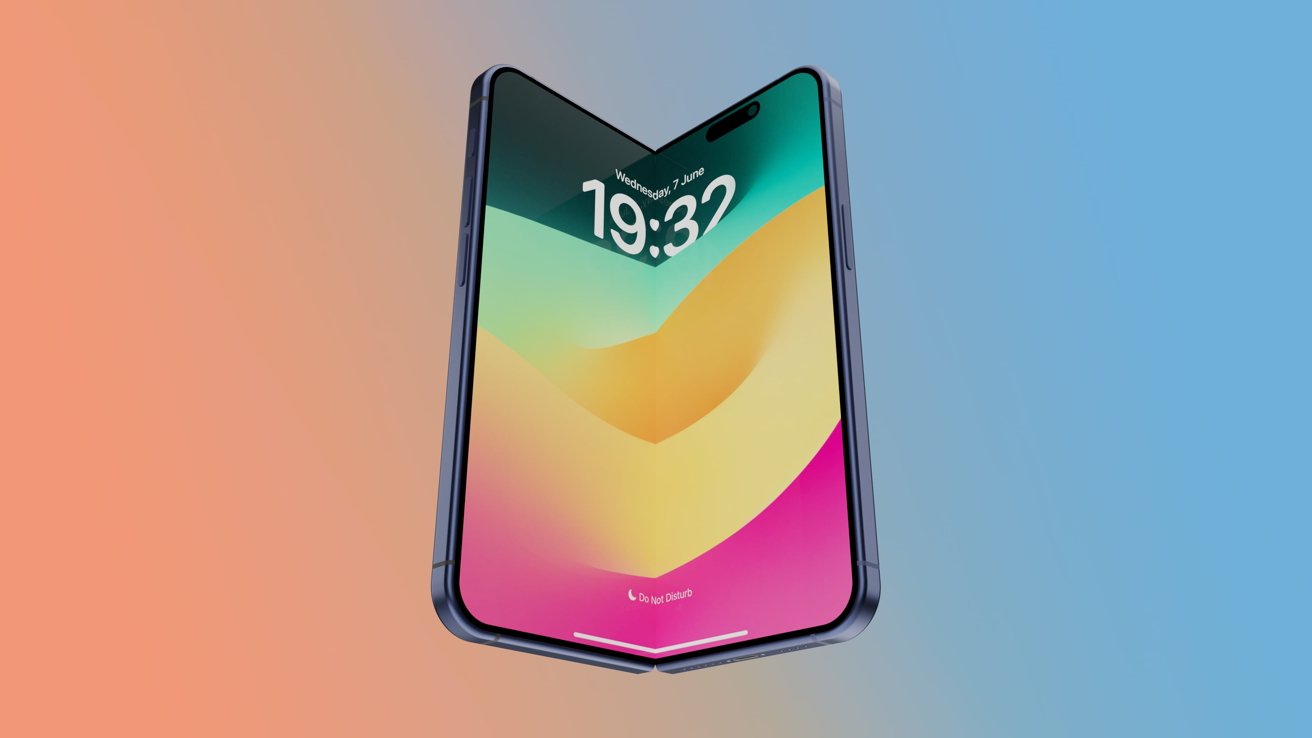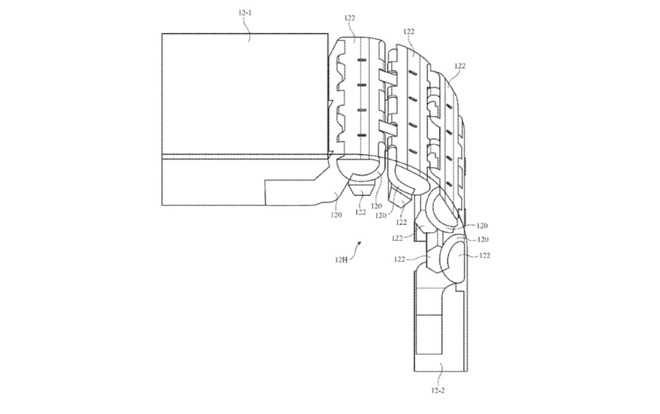Articulated hinge structures for foldable iPhone detailed in new research
Apple is continuing to develop non-traditional display technology that can fold out and expand along hinge articulation points, likely for a future foldable iPhone.

A render of what the iPhone Fold could look like
Even though Apple has not released a folding iPhone, it continues to file patent applications on the topic -- and, as with this latest one, to get those patents granted. Some of the now wide-ranging patents detail scroll-like or slidable displays that expand.
The newly granted patent is called "Electronic devices having folding expandable displays." In it, Apple continues its foldables research with much more detail about potential hinge structures.
An early illustration in the patent, which was first filed back in February 2020, details a foldable device bent at a right angle. Notably, the figure shows a new multi-link hinge structure with more than just one articulation joint.
This is only one such potential hinge that Apple is researching. The patent text indicates that hinge structures could include "gear teeth, belts, and/or other movement synchronization structures" and may also sport "members that move relative to each other during bending."
Those moving members may compromise bars and links with opposing curved bearing surfaces, including stop surfaces that "prevent excessive rotation of the bars and links with respect to each other." These links could rotate around a pivot point that lies within a display without the actual hinge structure "living within the thickness of the display."

The multi-link hinge structure described in the patent. Credit: Apple
The patent also calls back to other expandable or slide-out displays, noting that a device with "housing structures that support folding motions, sliding motions, scrolling motions, and/or other behavior" could provide more screen real estate for users in a compact size.
Additionally, the patent runs through some ways that a hinge structure could prevent undue display stress during folding and unfolding, including specific hinge types, stress minimization components, stop surfaces, and friction to control the amount of force applied to the hinge.
Folding screens for many devices
Apple doesn't restrict the display technology to the iPhone, though. It notes in the patent that the foldable or expandable device could be applied to a slew of different device types, including wristbands, pedants, laptops, glasses, goggles, embedded kiosk systems, or devices within vehicles. The depiction of the device as a smartphone is just an example, the patent adds.
A good portion of the patent details the kinds of materials such a device could be crafted from; the kind of electronic circuitry that would power it; and the types of sensors, buttons, and other components.
The patent lists Owen D. Hale; Tatsuya Sano; Chang-Chia Huang; Yasmin F. Afsar; Hoon Sik Kim; and Michael B. Wittenberg. Of them, Kim has worked on different expandable display technologies for Apple, while Wittenberg was named in an Apple Watch band patent and a force-sensitive Touch ID patent.
Apple files numerous patents on a weekly basis, so they are not a reliable indicator of the company's imminent plans. More than that, they don't provide any timeline for when such technology could reach the market.
Read on AppleInsider

Comments
Personally, I think the idea is here to stay. We just need for prices to come down
Um No.
Apple has been working on this device for years. IF Apple releases it, it won't be some crappy rushed product to beat Apple to market(looking at you Samscum).
Just to repeat the obvious:
iPhone:
"The touch gimmick won't work because your fingers hide content and they removed the keyboard!! Stupid Apple!"
iPad:
"iPad won't work because it's just a giant iPod touch! People could just buy a pocket-sized one! Stupid Apple!"
Apple Watch:
"Apple Watch won't work because it does the same thing as an iPhone/iKnockoff!! Dead on arrival useless product! Stupid Apple!"
Segue: Remember the netbook? Those netbooks were hugely popular — unlike these foldable screen devices — but they were gone after a few years on the market because they weren't good products for consumers. Just like the foldable screen device, everyone said Apple should make one and it's a good thing they didn't. Of course, the cost of entry is much higher for these devices which is limiting their ability to have a metric rise, but the use case is still being shoehorned. I'm sure there are legitimate cases, but are they commonplace to be mass market?
NME Article:
PlayStation is adding smells to its games with cutting edge tech